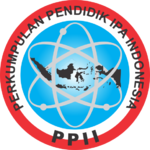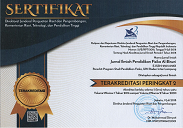Pembelajaran Kooperatif Tipe Group Investigation (GI) dengan Metode Know-Want-Learn (KWL): Dampak terhadap Hasil Belajar Fluida Dinamis
Abstract
Penelitian ini bertujuan untuk mengetahui pengaruh model pembelajaran kooperatif tipe GI dengan metode Know-Want-Learn terhadap hasil belajar siswa. Jenis penelitian ini adalah quasi experiment dengan populasi seluruh siswa kelas XI SMA Negeri 21 Medan T.P. 2016/2017. Pengambilan sampel dilakukan dengan cara cluster random sampling. Instrumen yang digunakan dalam bentuk pilihan berganda dengan 5 pilihan jawaban sebanyak 15 soal. Kemudian pada kedua kelas diberikan perlakuan yang berbeda, kelas eksperimen dengan model pembelajaran kooperatif tipe GI dengan metode Know-Want-Learn (KWL) dan kelas kontrol dengan pembelajaran konvensional. Setelah pembelajaran selesai diberikan, diperoleh postes dengan nilai rata-rata hasil belajar siswa pada kelas eksperimen 74,7dan kelas kontrol 63,53. Berdasarkan hasil analisa perhitungan uji t, ada pengaruh model pembelajaran kooperatif tipe GI dengan metode Know-Want-Learn (KWL) terhadap hasil belajar siswa pada materi pokok Fluida dinamis di kelas XI SMA Negeri 21 Medan T.P 2016/2017.
Group Investigation (GI) Cooperative Learning Through The Know-Want-Learn (KWL) Method: The Impact on Dynamic Fluid Learning Outcomes
This research purposes to know the effect learning cooperative model type GI with Know-Want-Learn method toward the result of student learning. The type of research was quasi-experiment with the population in this research is all students in class XI SMA Negeri 21 Medan A.Y.2016/2017. Cluster random sampling technique took the sample. The instrument that used is multiple choice with five options answer as much as 15 items. Then two classes give different learning, experiment class with cooperative learning model type GI with Know-Want-Learn method and control class with conventional learning. After learning had been given, got post-test with average calculation value of student experiment class is 74,7 and control class is 63,53. Based on the results of calculation of t-test analysis, there is the effect learning model cooperative type GI with Know-Want-Learn method toward the result of student learning at the dynamic fluid topic in class XI SMA Negeri 21 Medan A.Y.2016/2017.
Keywords
Full Text:
PDFReferences
Akçay, N. O., & Doymuş, K. (2012). The Effects of Group Investigation and Cooperative Learning Techniques Applied in Teaching Force and Motion Subjects on Students’ Academic Achievements. Journal of Educational Sciences Research, 2(1), 109–123.
Amelia, R., & H, S. K. (2016). The Influence of V Diagram Procedural Scaffolding in Group Investigation Towards Students with High and Low Prior Knowledge. Jurnal Pendidikan IPA Indonesia, 5(1), 109–115.
Billy, M., Hendriyanti, M. E., & Resti, V. D. A. (2017). Profil Kemampuan Berpikir Kritis Siswi Melalui Model Pembelajaran Group Investigation (GI) pada Konsep Sistem Gerak. Biodidaktika, 12(2), 25–44.
Chusni, M. M., Mahardika, A., Sayekti, I. C., Setya, W., Magelang, U. M., & Surakarta, U. M. (2017). The Profile of Student Activities in Learning Basic Natural Science Concepts through The Contextual Teaching and Learning ( CTL ) Approach with Group Investigation (GI) Model. Jurnal Penelitian dan Pembelajaran IPA, 3(1), 1–10.
Derlina, & Pane, K. I. (2016). Kemampuan Pemecahan Masalah Siswa SMA dalam Model Pembelajaran Berbasis Masalah dengan Metode Know-Want-Learn (KWL). Jurnal Saintech, 8(3), 1–10.
Erlinda, N. (2017). Peningkatan Aktivitas dan Hasil Belajar Siswa melalui Model Kooperatif Tipe Team Game Tournament pada Mata Pelajaran Fisika di SMK. Tadris: Jurnal Keguruan Dan Ilmu Tarbiyah, 2(1), 47–52.
Gumrowi, A. (2016). Strategi Pembelajaran Melalui Pendekatan Kontekstual dengan Cooperative Learning untuk Meningkatkan Hasil Belajar Gelombang Siswa Kelas XII MAN 1 Bandar Lampung. Jurnal Ilmiah Pendidikan Fisika Al-BiRuNi, 5(2), 183–191.
Iswardati. (2016). The Implementation of Group Investigation to Improve the Students ’ Speaking Skill. Dinamika Ilmu, 16(2), 245–261.
Komikesari, H. (2016). Peningkatan Keterampilan Proses Sains dan Hasil Belajar Fisika Siswa pada Model Pembelajaran Kooperatif Tipe Student Team Achievement Division. Tadris: Jurnal Keguruan Dan Ilmu Tarbiyah, 1(1), 15–22.
Mustari, M. (2015). Pengaruh Penggunaan Media Gambar Lewat Komputer terhadap Hasil Belajar Fisika pada Siswa Kelas X SMA Negeri 3 Makassar. Jurnal Ilmiah Pendidikan Fisika Al-BiRuNi, 4(2), 269–280.
Nurlaela, N., & Suwono, Hadi, S. (2017). Pengaruh Pembelajaran Inkuiri Sains Berbantuan Know , Want , Learn ( Kwl ) terhadap Hasil Belajar Kognitif Biologi. Jurnal Pendidikan:teori, Penelitian, Dan Pengembangan, 2(2), 186–191.
Poniman. (2016). Upaya Peningkatan Aktivitas dan Hasil Belajar Fisika dengan Metode Praktikum pada Siswa Kelas XI IPA MAN 1 Kalianda Lampung Selatan. Jurnal Ilmiah Pendidikan Fisika Al-Biruni, 5(2), 257–264.
Santoso, A. B. (2015). Pengaruh Metode Pembelajaran KWL ( Know , Want , Learn ) Terhadap Hasil Belajar Siswa di SMK Negeri 2 Surabaya. Jurnal Pendidikan Teknik Elektro, 4(3), 725–731.
Saputra, W. N. E. (2016). Jurnal Konseling dan Pendidikan. Jurnal Konseling Dan Pendidikan, 4(1), 39–45.
Sasmita, P. R. (2017). Penerapan metode inkuiri terbimbing menggunakan media kit fisika: upaya meningkatkan aktivitas dan hasil belajar fisika siswa. Jurnal Ilmiah Pendidikan Fisika Al-Biruni, 6(1), 95–102.
Sasongko, H. W. (2014). Tinjauan Keefektifan GI Menggunakan Alat Peraga Manipulatif dari Aspek Prestasi Belajar Bangun Ruang Sisi Datar dan Apresiasi terhadap Matematika SMP. Pythagoras: Jurnal Pendidikan Matematika Volume, 9(2), 136–146.
Simsek, U. (2012). The Effects of Reading-Writing-Presentation and Group Investigation Methods on Students ’ Academic Achievements in Citizenship Lessons. Journal of Educational Sciences Research, 2(2), 189–201.
Wijayanti, W., Maharta, N., & Suana, W. (2017). Pengembangan Perangkat Blended Learning Berbasis Learning Management System pada Materi Listrik Dinamis. Jurnal Ilmiah Pendidikan Fisika Al-Biruni, 6(1), 1–12.
Yusuf, M. T., & Amin, M. (2016). Pengaruh Mind Map dan Gaya Belajar terhadap Hasil Belajar Matematika Siswa. Tadris: Jurnal Keguruan Dan Ilmu Tarbiyah, 1(1), 85–92.
Zouhor, Z., Bogdanović, I., & Segedinac, M. (2016). Effects of the Know-Want-Learn Strategy on Primary School Students ’ Metacognition and Physics Achievement. Journal of Subject Didactics, 1(1), 39–49.
Zulva, R. (2016). Hubungan Antara Keterampilan Berpikir Dalam Pembelajaran Kooperatif Menggunakan Constructive Feedback. Jurnal Ilmiah Pendidikan Fisika Al-Biruni, 5(1), 61–69.
DOI: http://dx.doi.org/10.24042/jipfalbiruni.v6i2.1369
Refbacks
- There are currently no refbacks.

Jurnal ilmiah pendidikan fisika Al-Biruni is licensed under a Creative Commons Attribution-ShareAlike 4.0 International License.
![]()







